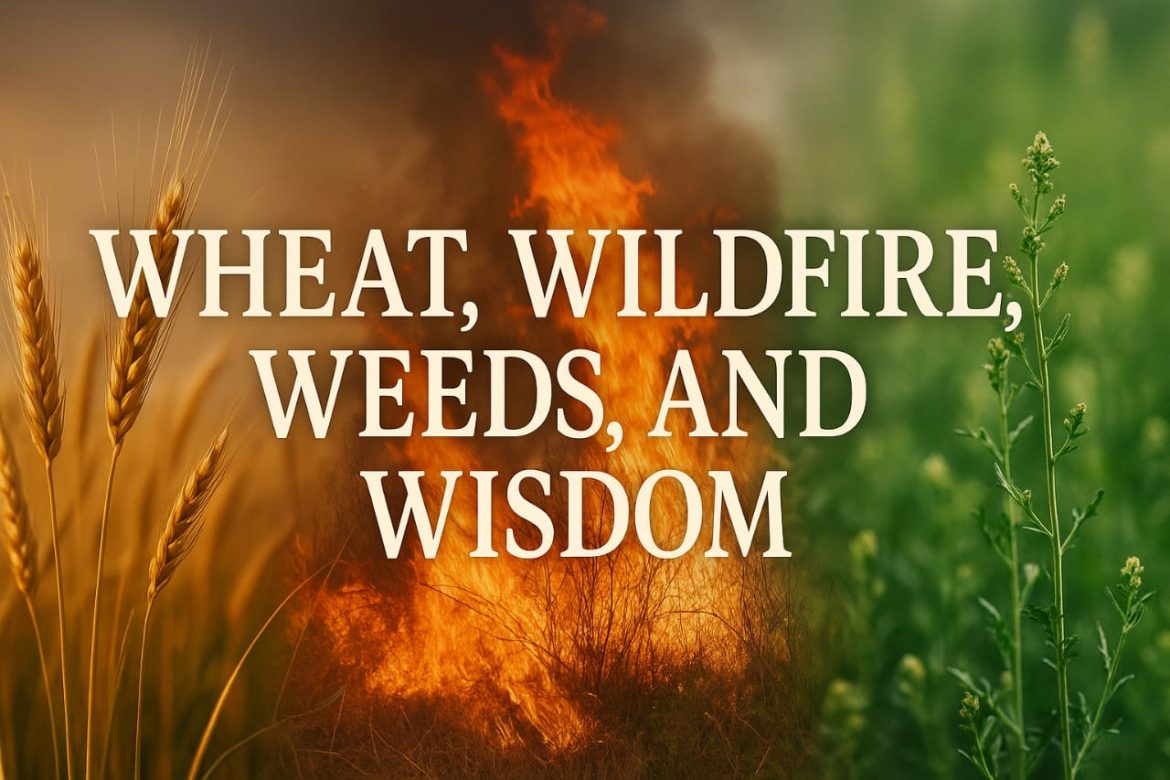Five Things We Will Learn
- How persecution scattered the early church and fueled the spread of the gospel.
- Why the gospel’s wild growth was both beautiful and chaotic.
- How Barnabas and Paul brought apostolic order to new believers.
- Why Paul’s letters served as essential “weeding and pruning” for the church.
- How apostolic order and relationship sustained long-term growth—and why it still matters today.
The Scattering of the Early Church
When Saul unleashed persecution after Stephen’s death, believers fled Jerusalem in fear for their lives. Acts 8:1–4 and 11:19 paint the picture: they left behind homes, jobs, family, friends, and livelihoods just to survive. Imagine abandoning everything—your house, your income, your community—just to avoid prison or death.
Yet, in places like Cyprus, Phoenicia, and Antioch, they didn’t stay silent. Despite their deep wounds and loss, they preached the gospel boldly, and Acts 11:21 says many turned to Christ. Their courage was heroic, but it came at a steep cost, leaving scars that shaped their journey.
And here’s the amazing thing—these scattered believers were living out the very words of Jesus:
“Truly, I say to you, there is no one who has left house or brothers or sisters or mother or father or children or lands, for my sake and for the gospel, who will not receive a hundredfold now in this time … and in the age to come eternal life.” — Mark 10:29–30
In leaving their homes and families for the sake of the gospel, they weren’t losing—they were stepping into Jesus’ promise. Their scattering was not abandonment but multiplication, as the gospel spread into new lands and new hearts.
And isn’t that true today? Many of us may not face fleeing for our lives, but we know the cost of following Jesus—strained family ties, career changes, rejection, or giving up comfort. The same promise still holds: what feels like loss for Christ’s sake becomes multiplied fruit in His kingdom.
Wild Growth of the Gospel
This scattering led to what you could call wild growth—and that’s exactly what it was. People were hearing about Jesus, believing, and spreading the word like never before. In Antioch, Acts 11:20–21 says some believers from Cyprus and Cyrene began preaching to Greeks, not just Jews, and a great number turned to the Lord.
It was raw, passionate, and unstoppable—like seeds sprouting everywhere, no matter the soil. Cyprus, Samaria, Antioch—these places were buzzing with new believers. But with growth came messiness: a garden with no fences, no rows, just plants shooting up everywhere, tangled with weeds.
We can relate today. In moments of revival, on college campuses, in neighborhoods, and even online, the gospel can spread like wildfire. People encounter Jesus, faith sparks, and testimonies multiply. But just like then, raw growth without grounding can feel overwhelming and chaotic.
The Beauty and Chaos of New Believers
New believers are a beautiful thing, right? Their zeal, their raw faith—it’s electric. In Acts, we see folks embracing the gospel with no formal training, just telling everyone about Jesus. But without structure, things get shaky fast. Think of Corinth or Galatia: new Christians were mixing pagan ideas with the gospel, arguing over leaders, or living in ways that didn’t line up with their faith.
Acts 11:21 shows the Spirit was moving powerfully, but without guidance, that wild growth risked being choked out by confusion, false teachings, or divisions. It’s like planting a garden but not weeding or watering properly—it might start strong but won’t last.
The same thing happens now. Someone finds Jesus, and they’re on fire—but if no one disciples them, they might mix biblical truth with cultural fads or internet theology. The fire is real, but without guidance, it can burn out.
God Sends Barnabas and Paul
Here’s where God steps in with a plan. Enter Barnabas and Paul, two men called as apostles to bring order to this beautiful chaos. Barnabas, the encourager, gets sent to Antioch in Acts 11:22–24 and sees the grace of God at work. He doesn’t squash the growth; he nurtures it, teaching and strengthening the believers. Then he grabs Paul, fresh from his conversion in Acts 9, and they team up in Antioch for a whole year, grounding the church (Acts 11:25–26).
By Acts 13, they’re sent out by the Holy Spirit, hitting Cyprus and Pisidian Antioch, preaching, planting churches, and setting things straight. These guys weren’t just preachers; they were God’s gardeners, shaping the wild growth into something that could endure.
And we need the same today. God still raises up leaders who don’t kill revival fire but guide it—encouraging, teaching, and giving it roots so it can last through storms.
Paul’s Letters: Weeding the Garden
Paul’s apostolic role shines through in his letters, where he’s like a master gardener pulling weeds and pruning branches. In fact, scholars estimate that 30–50% of the New Testament is devoted to dealing with these weeds—false teaching, immorality, church order, pride, and division. The early church grew fast, but without constant pruning, that growth could have been strangled.
Just to mention a few:
- Galatians – Paul confronts false teachers who were demanding circumcision, choking out the gospel of grace (Galatians 1:6–9).
- 1 Thessalonians – He corrects misunderstandings about Jesus’ return, keeping the church focused on hope and holiness (1 Thessalonians 4:13–5:11).
- Philippians – He deals with disunity, urging believers to humble themselves and put others first (Philippians 2:1–4).
And that’s only the beginning. If you trace his letters, you see Paul addressing nearly every church he planted or influenced:
- Corinth – immorality in the church, lawsuits among believers, and chaos in worship services (1 Corinthians).
- Galatia – legalism threatening the very heart of the gospel.
- Ephesus – warnings about false teachers and instructions for unity, maturity, and spiritual warfare (Ephesians, and later 1 & 2 Timothy).
- Philippi – urging humility and perseverance in suffering.
- Colossae – confronting heresies mixing Greek philosophy with the gospel (Colossians).
- Thessalonica – clarifying the second coming of Christ and warning against idleness.
- Rome – grounding the church in sound doctrine and unity between Jews and Gentiles.
- Crete – through Titus, establishing leadership and rebuking false teachers (Titus 1:5–16).
- Everywhere – reminders of purity, order, love, humility, endurance, and faith in Christ alone.
Each letter pulls up weeds that threatened to choke the church and plants instructions for lasting growth. And Paul never pruned just for the sake of control—he always did it to protect the harvest. As he wrote in Ephesians 4:11–16, apostles, prophets, evangelists, pastors, and teachers exist to equip believers until the whole church matures in Christ.
If Paul were writing today, his letters might address our modern weeds—celebrity culture, social media arguments, shallow discipleship, prosperity distortions, cultural compromise, gender dysphoria, the redefinition of marriage, and the breakdown of family order. The forms may change, but the need for pruning never does.
The Role of Apostolic Order
This apostolic order —it’s the backbone of the early church’s survival. Paul and Barnabas didn’t just preach and leave; they appointed elders, like in Acts 14:23, to keep churches on track. They sent trusted leaders like Timothy and Titus to places like Ephesus and Crete to establish structure—think Titus 1:5, where Paul tells Titus to appoint elders in every town.
This wasn’t about control; it was about giving the church roots deep enough to withstand storms. Without this order, the wild growth could’ve fizzled out or been overtaken by those weeds—false teachings, divisions, or cultural compromises. Apostolic guidance gave the church direction, accountability, and a framework to keep growing.
And we need it just as much today. Revival sparks come and go, but without discipleship and structure, they fade. Godly leadership is not an obstacle to freedom—it’s the trellis that lets the vine keep climbing.
Sustaining the Growth Through Relationship
Here’s the key: it wasn’t just rules or structure. Apostolic order worked because it was rooted in relationship. Paul calls the churches his children in 1 Corinthians 4:14–15, showing his heart for them. He and Barnabas built trust, like when Barnabas vouched for Paul in Acts 9:27, helping the church accept him. Their visits, letters, and sent leaders like Timothy weren’t distant commands; they were personal, invested efforts to see churches thrive.
That relationship—apostles walking with churches, correcting with love, teaching with patience—is what kept the wild growth from wilting. It’s why churches in Antioch, Corinth, and beyond didn’t just survive but became pillars of the faith.
And isn’t it the same today? We don’t thrive on podcasts, YouTube sermons, or books alone. We grow when spiritual fathers and mothers walk with us—discipling, correcting, and encouraging us in real relationship.
Why It Matters
Wild growth is a gift, but it’s not enough on its own. The New Testament shows us that without apostolic order, the church risked becoming a flash in the pan—exciting but unsustainable. Paul and Barnabas, through their travels, teachings, and letters, gave the church what it needed: a foundation to grow strong, not just wide.
They pulled out the weeds, set up leadership, and fostered relationships that tied believers to Christ and each other. That’s what turned scattered seeds into a lasting harvest.
And today, the same lesson applies. Passion and zeal ignite movements, but order and discipleship sustain them. Without one, the other falters. But when both work together—wild growth guided by apostolic wisdom—the church doesn’t just spread. It thrives.




